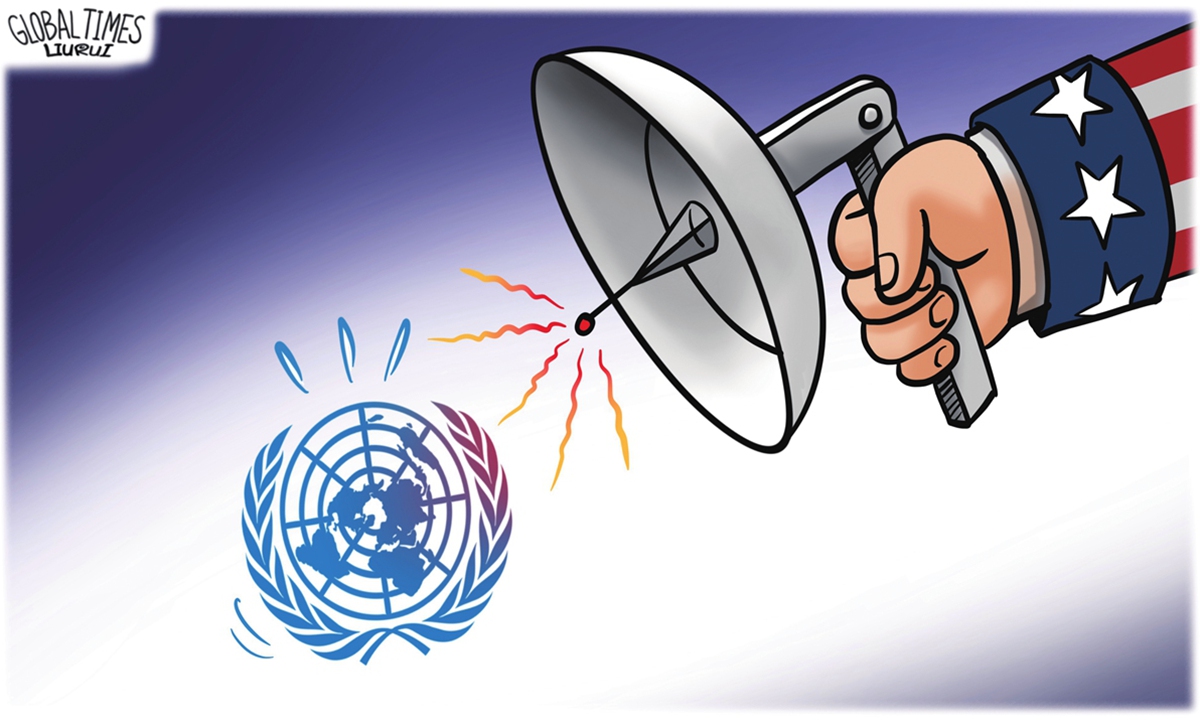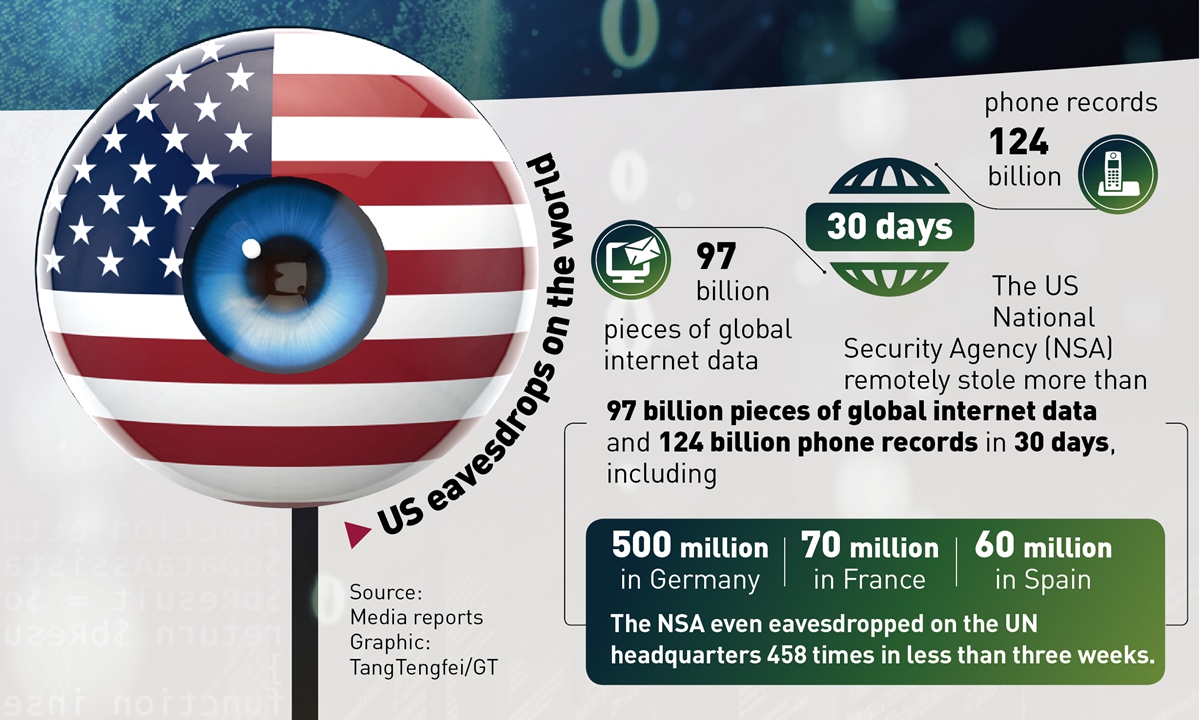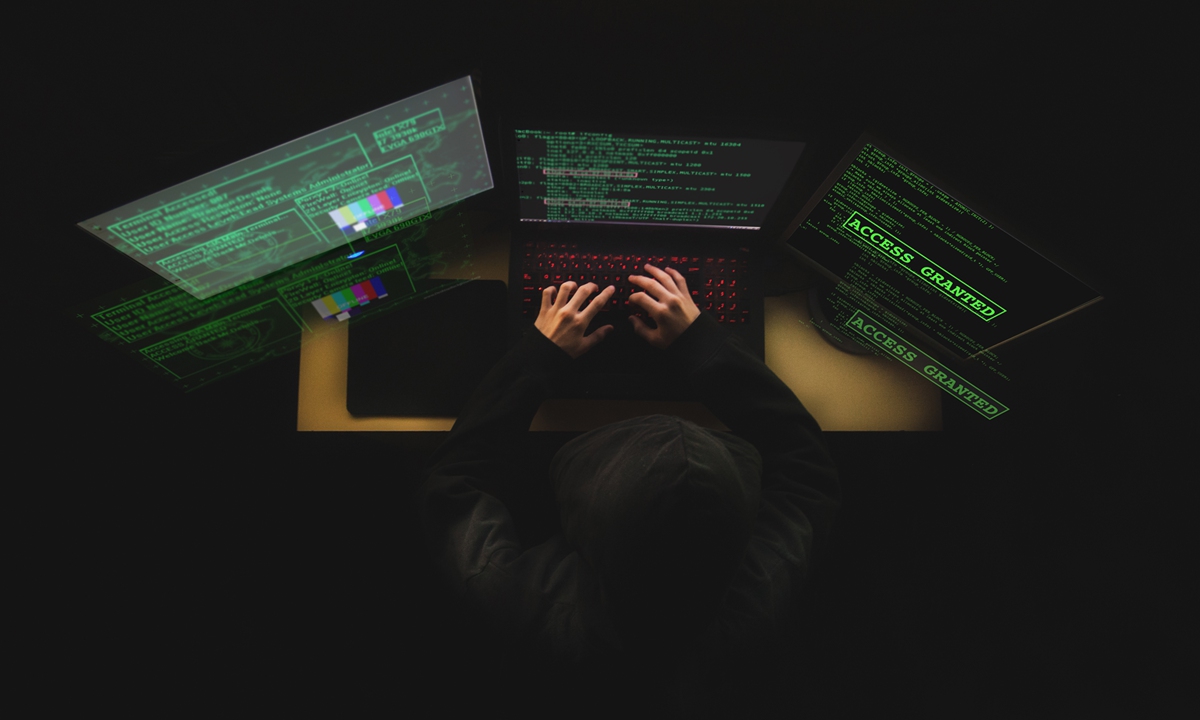Editor’s Note:
It has been a decade since the PRISM scandal which enraged the world was exposed by Edward Snowden. Under the guise of so-called national interests, the US government and its related intelligence agencies utilize their technological and first-mover advantages to conduct cyber surveillance and attacks around the world.
Relying on its hegemony in cyberspace, the US has used cyber capabilities as one of its tools in hybrid warfare. Just like other tools such as economic sanctions, terrorist activities, and military intervention, the US has used cyberwar to interfere in other countries’ internal affairs and achieve its own political goals. To maintain its hegemony, the US has conducted “digital colonization” over other countries and committed various convert crimes, making itself a “surveillance empire,” an “attacking empire” and a “bullying empire.”
In the second installment of the series, we invited Tang Lan, director of the Center for Cyberspace Security and Governance Studies at the China Institutes of Contemporary International Relations, to explain why the US is a veritable “surveillance empire” and to give further evidences of the US government’s monitoring of both its allies and its citizens indiscriminately, ripping off the fig leaf of “American-style human rights.”

Eavesdropping on world leaders. Graphic: GT
In the early summer of 2013, Edward Snowden, a former US defense subcontractor who leaked highly classified information through the Guardian, the Washington Post, and other media outlets, revealed a huge “surveillance empire” to the world. Ten years later, new evidence about the US’ surveillance continues to emerge, showing the US’ obsession with impenetrable, ubiquitous surveillance and monitoring around the globe. The fact that the US has been conducting indiscriminate surveillance on its allies and its own people for a long time has also made the world become more aware of the hypocrisy of the US in pursuing its own selfish hegemonic desire under the cloak of human rights and democracy.
No place to hide
Among all the sets of documents released by Snowden in 2013, the most sensational was the widely known PRISM program. Leaked documents showed that US intelligence and law enforcement agencies could access data and monitor 10 types of information around the world, including email, voice chat, videos, photos, file transfers, and social networking details, according to a report by the Guardian in 2013.
The US’ greatest victims in its global surveillance campaign have been its European allies. According to leaked documents, the US National Security Agency (NSA) remotely stole more than 97 billion pieces of global internet data and 124 billion phone records in 30 days, including 500 million in Germany, 70 million in France, and 60 million in Spain.
Former German chancellor Angela Merkel was among 35 leaders who were under US surveillance, for which the former German leader was spied on for 11 years. The NSA even monitored UN video phone conferences system of the UN headquarters, eavesdropping 458 times in less than three weeks.
But US’ spying on its allies goes far beyond these incidences. In 2015, WikiLeaks revealed that between 2006 and 2012, the NSA had spied on three French presidents, so as to obtain information about their political and foreign policy agendas.
The Washington Post revealed in 2020 that in the 1970s, Crypto AG, a Swiss encryption company was secretly owned by the US Central Intelligence Agency (CIA) in a highly classified partnership with West German intelligence to monitor more than 120 countries by using products made by the company.
On May 30, 2021, according to a report released by Danish public broadcaster Danmarks Radio (DR), the US had used a partnership with Denmark’s foreign intelligence unit to spy on European leaders and senior German, French, Swedish, Norwegian officials, among others, in 2014 and 2015. The discovery was made in an internal investigation, code-named “Operation Dunhammer,” by DR after Snowden’s revelation. The contents of the surveillance involved mobile phone messages, phone calls, internet search records, and chat histories.
In April this year, US surveillance of its allies was further proven by a set of US military documents shared in an online game chat group. These documents showed that the US possesses a trove of classified information, including the deployment of Ukrainian air defense systems, conversations between Ukrainian President Volodymyr Zelensky and Ukrainian officials, and secret discussions between South Korean officials about whether Korea should provide lethal weapons to Ukraine.

Big brother is watching. Illustration :Liu Rui/GT
Angel on the left, devil on the right
If the surveillance of foreign countries can still be swept under the proverbial rug of safeguarding national security and anti-terrorism, then the violation of the human rights and privacy of US citizens completely exposes the US government’s pretense and duplicity.
A decade ago, Snowden revealed that in 2007, former US president George W. Bush authorized the NSA, FBI, and CIA to conduct mass surveillance on any US citizens and related foreign companies. Part of the task of the Stellar Wind program, which dates back to 1994, is to search and collect US citizens’ communications information, including emails, phone conversations, financial transactions, and activity on the internet.
Its final aim is to build a giant “data collector” which could cover the global communication network and store data secretly. A secret data storage facility in Bluffdale, Utah, which is also the largest data center in the US, can store at least 100 years of the worldwide communication. It can also create a personal profile detailing the lives of every American citizen, including members of the Congress, according to media reports.
In Snowden’s autobiography which was published on September 17, 2019, he stated that the NSA’s ultimate goal was to store the information it collected forever for later use, creating a perfect memory bank, a permanent record file. That is why he called his autobiography Permanent Record.
Apart from that, the US Immigration and Customs Enforcement (ICE) has designed a complex surveillance network to spy on most people living in the US without being issued with a warrant, according to a report named American Dragnet: Data-Driven Deportation in the 21st Century issued by the Center on Privacy and Technology at the Georgetown University Law Center in July, 2022.
Between 2008 and 2021, the ICE had spent $2.8 billion on surveillance, data collection, and data sharing, which gave it access to the private data of 75 percent of US adults and more than 218 million users in 50 states and territories in the country.
Additionally, the 2021 Annual Report from the Office of the Director of National Intelligence showed that without a warrant, the FBI has searched US citizens’ electronic data as many as 3.4 million times.
Elon Mask, Twitter owner, said in an interview with Fox News in April 2023, that he was shocked to find out the true scale of the US government’s access to Twitter data, including personal communications on the platform. “The degree to which various government agencies effectively had full access to everything that was going on on Twitter blew my mind,” Musk said.
Addiction beyond law and morality

Graphic: GT
The US’ surveillance tradition is rooted deep in its history. From the Black Box program after the World War I and Operation Shamrock after World War II, to the Echelon global surveillance system during the Cold War, the means by which it conducts surveillance have continually been upgraded, and the targets and contents of surveillance have also been expanded.
As human society becomes increasingly digitized, interconnected, and intelligent, the US has been able to use its technological advantages to collect data in a more covert and rampant way, and develop its data analysis capabilities.
Through legislation and amendments, the US government can carry out its monitoring activities in a more convenient way, covering up its intention of hegemony in the name of national security. After the 9/11 attacks, the US launched the Patriot Act, amended the Foreign Intelligence Surveillance Act (FISA), and the Communications Assistance for law Enforcement Act (CALEA). These moves solidified and expanded the authority of the FBI, CIA, NSA, and other US departments to monitor countries around the world.
In 2008, the US Congress enacted Section 702 of the FISA, authorizing intelligence agencies to secretly monitor and collect communications of targeted foreigners abroad without a court-issued warrant. In 2018, the Congress approved an extension of the section to last until December 31, 2023.
Based on the above Acts, countless tech companies become “known accomplices” of the US government.
Under the PRISM program, companies such as Microsoft, Yahoo, Google, Facebook, Paltalk, YouTube, Skype, AOL, and Apple are required to allow regular collection of emails, photos, video chats, and web browsing records by US intelligence agencies, as well as any other data stored in these companies’ cloud servers.
Many data service providers and tech startups are also seen by the US government as supplementary intelligence resources. In early 2021, The New York Times disclosed that the Defense Intelligence Agency (DIA) would collect the location information of US citizens from third-party apps on users’ phones without warrants.
There is no denying that the Internet originated in the US, and the global digital infrastructure and the operation of the Internet still mostly rely on hardware, software, technologies, standards, transport protocols, and domain name resolution services provided by the country. It is precisely this dependence that allows the US to weave a vast surveillance network with no fear and take advantage of other countries’ trust to steal their money and secrets.
In fact, before Snowden’s exposure, Europe had already known about the surveillance activities of the US. The European Parliament had organized a special temporary committee to investigate the Echelon system in the US.
Germany, France, Sweden, Brazil, and other affected countries have repeatedly expressed the unacceptable nature of US surveillance but their remonstrations all fell on deaf ears. The fundamental reason is that they cannot get rid of their technological dependence on the US and were threatened in terms of security by the US.
Actions always speak louder than words. How can we explain the US’ behavior if not the use of its technological advantage to coerce and bully other countries? This is why the US is suppressing China’s Huawei all over the world. The reason is simple: “How can we spy on you when you are using Huawei?”
How can ‘Technology for Democracy’ be convincing?
The Biden administration advocates for “value-based diplomacy” and purports to fly the banner of “guardian of democracy.” At the “Summit for Democracy” held by the US since 2021, the US firstly advocated for relevant countries to “secure and ensure that the Internet reinforces democracy principle and human rights and fundamental freedoms.” Later on, it proposed to enhance democracy through science and technology and to unite allies to develop “technologies that are consistent with democratic values and interests”.
However, the continuous exposure of the US’ surveillance undoubtedly makes a great mockery of the US’ vaunted human rights and rule of law.
After the Prism scandal, the US promised not to spy on the communication equipment of German politicians, but new evidence of spying was exposed after the fact. Where is the credibility of the US as a standard for democracy?
Just recently, the EU privacy regulators fined Facebook’s parent company Meta a record $1.3 billion, for illegally storing data about European users on servers in the US for years that could have been accessed by American spy agencies. Andrea Jelinek, President of the European Data Protection Board, described Meta’s infringement as “very serious since it concerns transfers that are systematic, repetitive, and continuous.”
The US has been blunt in its defense of mass surveillance, saying that spying on allies is not unusual in the realm of international relations and that intelligence agencies are simply “trying to better understand the world.”
But it needs to be noted that this approach to better understanding the world seriously undermines the sovereignty of other countries and the privacy of Internet users around the world, and seriously violates international law and the basic norms governing international relations.
Looking back on the successive leaks in the US since the information age, the whistleblowers of the US’ extensive nefarious dealings have been “programmers” or “geeks” such as Chelsea Elizabeth Manning, Julian Paul Assange, Edward Snowden and Jack Teixeira.
Some of them have experienced the development and growth of modern technologies such as Internet, and understand the power of technology and the harm it can cause if abused. Some of them are also addicted to the ACG subculture. The reason why they decide to be whistleblowers is as a by-product of disillusionment at the extent to which the US will go to conduct mass surveillance.
In the end, the US government put all the responsibility on these young people. It did not reflect on its own problems, let alone repair the growing rift within its citizenry, making it unsurprising that Snowden and others expressed their lack of confidence in the future of the US.
There are reasons to believe that US surveillance and theft on the internet that has been made public so far is just the tip of the iceberg. There is nothing wrong with the collection and analysis of intelligence, which is not prohibited by international law. But countries should also abide by their national obligations and the bottom line of international norms. The US approach, however, has absolutely no regard for privacy, human rights, or sovereignty. All the US wants is to “get the data and collect everything, so it can know everything.”
The human rights and democracy advocated for by the US is that it must have full liberty while others none. The democratic values claimed by the US are just a cover and a tool for itself to seek its own interests and the US’ mindset of hegemony will never change.













